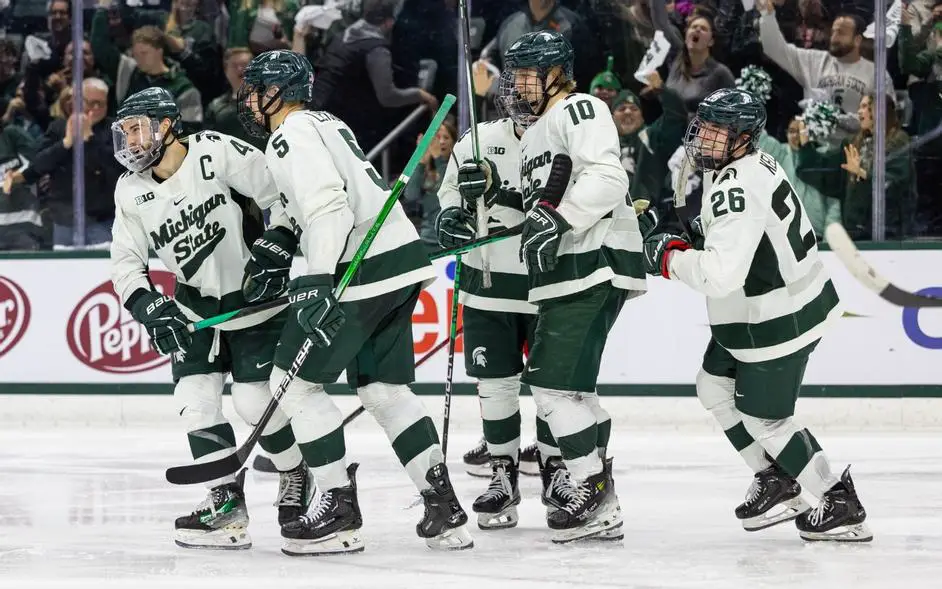
For two months now, I bemoaned what would happen if two hosts – Omaha and Massachusetts – qualified for the field.
The thought of having to move North Dakota from Sioux Falls and Boston University from Springfield is something I dreaded. But when all is said and done, this doesn’t feel that messy.
Well, at least I don’t think it is.
First let’s show you the field of 16, in order of their seeds, using the PairWise Rankings and automatic qualifiers:
1. Boston College*
2. Boston University
3. Denver*
4. Michigan State*
5. Maine
6. North Dakota
7. Minnesota
8. Wisconsin
9. Quinnipiac
10. Michigan
11. Omaha
12. Cornell*
13. Western Michigan
14. Massachusetts
15. RIT*
16. Michigan Tech*
* Indicates conference champion
Let’s take that field and seed it 1 through 16, using bracket integrity:
1. Boston College
8. Wisconsin
9. Quinnipiac
16. Michigan Tech
2. Boston University
7. Minnesota
10. Michigan
15. RIT
3. Denver
6. North Dakota
11. Omaha
14. Massachusetts
4. Michigan State
5. Maine
12. Cornell
13. Western Michigan
Okay, so let’s look at some issues. First and foremost, North Dakota and Omaha can’t face-off in the first round because it is an interconference matchup. I’m going to switch Omaha and Michigan.
1. Boston College
8. Wisconsin
9. Quinnipiac
16. Michigan Tech
2. Boston University
7. Minnesota
11. Omaha
15. RIT
3. Denver
6. North Dakota
10. Michigan
14. Massachusetts
4. Michigan State
5. Maine
12. Cornell
13. Western Michigan
That solves all interconference matchups. Now let’s place regional sites on each four-team bracket. Remember, UMass is the host in Springfield, Mass., and Omaha (not North Dakota), is the host in Sioux Falls.
Thus, I come up with the following:
Providence, R.I.
1. Boston College
8. Wisconsin
9. Quinnipiac
16. Michigan Tech
Sioux Falls, S.D.
2. Boston University
7. Minnesota
11. Omaha
15. RIT
Springfield, Mass.
3. Denver
6. North Dakota
10. Michigan
14. Massachusetts
Maryland Heights, Mo.
4. Michigan State
5. Maine
12. Cornell
13. Western Michigan
We knew once UMass qualified, that would take the lower of the two Hockey East number one seeds – BC and BU – would be shipped west to avoid the interconference matchup with UMass. Same for Omaha and North Dakota, but we solved that earlier.
Now, let’s talk attendance. Would I prefer North Dakota in Sioux Falls and BU in Springfield? Heck yes. But those aren’t possible.
Providence will be fine with Boston College and Quinnipiac. Springfield in concept will be okay with UMass, but it could use some help. Sioux Falls has the biggest issue, though Minnesota is only about 4.5 hours away. And Maryland Heights is so small (about 2,500 seats), I’m not concerned about attendance.
That said, we could make swaps two entire pairings – North Dakota vs. Michigan and Maine vs. Cornell – and swap them.
That gives us:
Providence, R.I.
1. Boston College
8. Wisconsin
9. Quinnipiac
16. Michigan Tech
Sioux Falls, S.D.
2. Boston University
7. Minnesota
11. Omaha
15. RIT
Springfield, Mass.
3. Denver
5. Maine
12. Cornell
14. Massachusetts
Maryland Heights, Mo.
4. Michigan State
6. North Dakota
10. Michigan
13. Western Michigan
Now you have three eastern teams in Springfield, Minnesota and Omaha in Sioux Falls, BC and Quinnipiac in Providence and four strong fan bases in Maryland Heights. If there’s any issue it is that you’ll create a demand for tickets in Missouri.
So that’s it. My final bracket. All of your number one seeds are playing the correct opponent (1 vs. 16, 2 vs. 15, etc.). And for the most part you have maintained pretty good bracket integrity.
Now let’s see what the committee does on Sunday.


